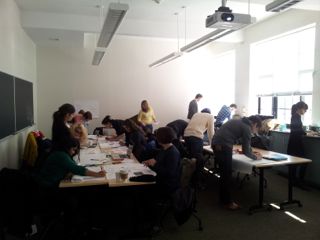Teaching
I'm passionate about teaching ecology and evolution for two reasons. First, the natural world is a fascinating place! Everyday I'm awed by biology, from the behavior of ants to patterns of human migration inferred using genetic data. Second, human society faces great challenges from climate change, sustainability and infectious disease in the 21st century. The methods in a biologist's toolkit are essential for responding to these challenges.
I've been involved in teaching biology at all age levels for over 10 years. My first job out of college was teaching K-12 students about nature at Rancho El Chorro Outdoor School. Since then, I've taught at the University of Minnesota, lectured at Macalester College, and have been a faculty member of the Citizen Science program at Bard College.
Philosophy
Education is fundamental to a student`s personal development and their engagement in our society and environment. Teachers have a critical role in this formation.

My general goals as a teacher are that students (1) develop the ability to think critically about complexity and (2) learn how to effectively communicate about this complexity in order to enrich their own lives and contribute to solving global challenges. Accomplishing these goals requires understanding the diversity of students and their learning styles, and engaging students in the learning process. While my teaching is focused on understanding complexity in the natural world, the skills I teach will transfer to all careers and generate life-long learning.
To achieve my teaching goals, I use active lecturing and problem-based learning to foster a positive learning environment that respects each student and their needs. Active lecturing is a key component in my teaching for efficiently transferring knowledge to students, emphasizing key points that may be overlooked in casual skimming of textbooks. However, lecturing alone can fail to achieve engagement from all students. I motivate students to want the information presented in lecture through problem-based learning. Students develop critical thinking skills by solving real-world problems presented in class. By working in teams, they also develop collaborative skills and complement each others' strengths and weaknesses. Most importantly, by coming to knowledge through the process of discovery, students retain more information and are better prepared to apply their knowledge and skills to future learning.

Teaching elementary students at Rancho El Chorro Outdoor School
Teaching Experience
- University of Vermont, guest lectures
- Exploring Biology
- Human Genetics
- Population Genetics
- Bard College
- Citizen Science faculty
- Macalester College, guest lectures
- Biodiversity and Evolution
- First-year seminar
- University of Minnesota, guest lectures
- Quantitative Genetics
- Evolution
- University of Minnesota, teaching assistant
- Foundations of Biology
- Evolution
